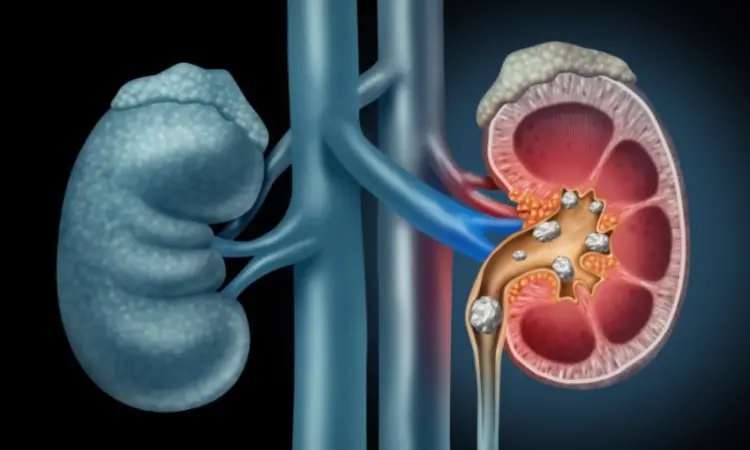- Home
- Medical news & Guidelines
- Anesthesiology
- Cardiology and CTVS
- Critical Care
- Dentistry
- Dermatology
- Diabetes and Endocrinology
- ENT
- Gastroenterology
- Medicine
- Nephrology
- Neurology
- Obstretics-Gynaecology
- Oncology
- Ophthalmology
- Orthopaedics
- Pediatrics-Neonatology
- Psychiatry
- Pulmonology
- Radiology
- Surgery
- Urology
- Laboratory Medicine
- Diet
- Nursing
- Paramedical
- Physiotherapy
- Health news
- Fact Check
- Bone Health Fact Check
- Brain Health Fact Check
- Cancer Related Fact Check
- Child Care Fact Check
- Dental and oral health fact check
- Diabetes and metabolic health fact check
- Diet and Nutrition Fact Check
- Eye and ENT Care Fact Check
- Fitness fact check
- Gut health fact check
- Heart health fact check
- Kidney health fact check
- Medical education fact check
- Men's health fact check
- Respiratory fact check
- Skin and hair care fact check
- Vaccine and Immunization fact check
- Women's health fact check
- AYUSH
- State News
- Andaman and Nicobar Islands
- Andhra Pradesh
- Arunachal Pradesh
- Assam
- Bihar
- Chandigarh
- Chattisgarh
- Dadra and Nagar Haveli
- Daman and Diu
- Delhi
- Goa
- Gujarat
- Haryana
- Himachal Pradesh
- Jammu & Kashmir
- Jharkhand
- Karnataka
- Kerala
- Ladakh
- Lakshadweep
- Madhya Pradesh
- Maharashtra
- Manipur
- Meghalaya
- Mizoram
- Nagaland
- Odisha
- Puducherry
- Punjab
- Rajasthan
- Sikkim
- Tamil Nadu
- Telangana
- Tripura
- Uttar Pradesh
- Uttrakhand
- West Bengal
- Medical Education
- Industry
Advancing Urolithiasis Treatment with Plant-Based Therapies: Study Sheds Light on Current Insights and Future Directions

Egypt: Natural substances provide a potential alternative or adjunctive therapy for urolithiasis, offering the prospect of reducing pain and enhancing patients' quality of life, a recent review has found.
The study, published in International Urology and Nephrology, however, has shown the need for additional research to elucidate their mechanisms of action and refine their therapeutic application. The promising potential of plant-based therapies in urolithiasis underscores ongoing research aimed at advancing global patient treatment outcomes.
Urolithiasis, commonly known as kidney stones, affects millions worldwide and presents with symptoms ranging from intense pain to complications such as obstruction of urinary flow. Current treatments primarily involve surgical intervention or pharmacological management, but their side effects and recurrence rates prompt the exploration of alternative therapies, particularly those derived from plants.
Considering the worldwide need for affordable treatment options, Essmat A. H. Allam & Mahmoud S. Sabra from Assiut University in Assiut, Egypt, explored the utilization of plant extracts and phytochemicals in preventing and treating urolithiasis.
For this purpose, the researchers systematically reviewed the literature on online databases following PRISM standards, focusing on herbal items evaluated in in vivo models, in vitro studies, and clinical trials related to nephrolithiasis/urolithiasis. They searched English language publications from 2021 to 2023.
The review included studies assessing the therapeutic potential of plant extracts and phytochemicals in urolithiasis. Data extracted included study design, plant type, stone type, solvent type, part of plant used, study references, and main findings. A total of sixty-four studies were included.
The researchers reported the following findings:
- Most studies used ethylene glycol to induce hyperoxaluria and nephrolithiasis in rat models.
- Various extraction methods were used to extract bioactive compounds from different plant parts.
- Several plants and phytochemicals, including Dolichos biflorus, Alhagi maurorum, Aerva lanata, Cucumis melo, and quercetin, demonstrated potential effectiveness in reducing stone formation, size, and number.
The systematic review underscores the growing interest and potential of plant-based therapies in urolithiasis treatment, aligning with a broader trend towards natural and holistic healthcare approaches. As research continues to evolve, the researchers hope these findings will pave the way for novel therapeutic options that improve outcomes and quality of life for patients.
"The systematic review offers a comprehensive evaluation of plant-based therapies for urolithiasis, highlighting their efficacy and paving the way for future advancements in kidney stone management," the researchers concluded.
Reference:
Allam, E.A.H., Sabra, M.S. Plant-based therapies for urolithiasis: a systematic review of clinical and preclinical studies. Int Urol Nephrol (2024). https://doi.org/10.1007/s11255-024-04148-9
Dr Kamal Kant Kohli-MBBS, DTCD- a chest specialist with more than 30 years of practice and a flair for writing clinical articles, Dr Kamal Kant Kohli joined Medical Dialogues as a Chief Editor of Medical News. Besides writing articles, as an editor, he proofreads and verifies all the medical content published on Medical Dialogues including those coming from journals, studies,medical conferences,guidelines etc. Email: drkohli@medicaldialogues.in. Contact no. 011-43720751


